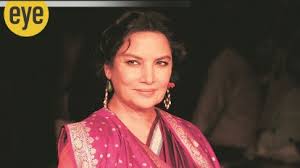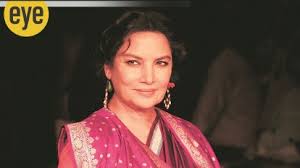
As Shabana Azmi celebrates a remarkable 50 years in Indian cinema, her career stands as a testament to the evolution and diversity of the film industry. Known for her versatile roles and impactful performances, Azmi’s journey from a young actress in the 1970s to a revered icon of Indian cinema provides a profound perspective on the changes and challenges within the industry. In a recent reflection on her career, Azmi emphasizes the need for mainstream cinema to drive change and innovation, arguing that true progress must come from the heart of the industry rather than from niche or alternative spaces.
Table of Contents
Early Career and Breakthrough Shabana Azmi
A Promising Start
Shabana Azmi began her cinematic journey with a determination to break away from traditional roles and stereotypes. Her debut in the film Ankur (1974), directed by Shyam Benegal, marked the beginning of a career that would redefine female roles in Indian cinema. The film’s realistic portrayal of social issues and Azmi’s compelling performance earned her critical acclaim and set the stage for her future success.
Rise to Prominence
Azmi’s career trajectory continued to soar with her roles in films like Nishant (1975) and Manthan (1976), which showcased her ability to portray complex characters with depth and nuance. Her collaborations with renowned directors such as Benegal and Govind Nihalani established her as a leading figure in the parallel cinema movement, a genre known for its focus on realism and social commentary.
Evolution of Cinema Shabana Azmi
The Mainstream vs. Parallel Cinema
Over the decades, Shabana Azmi has witnessed significant shifts in Indian cinema. The parallel cinema movement, which she was a prominent part of, sought to address social issues and offer a realistic portrayal of life, contrasting sharply with the glamorized narratives of mainstream Bollywood. While parallel cinema gained respect for its artistic and thematic richness, it often remained on the fringes of the industry’s mainstream success.
The Changing Landscape
The 1990s and 2000s saw the rise of new cinematic trends, including the advent of commercial cinema and the blending of traditional storytelling with contemporary themes. This period marked a significant transformation in the industry, with a growing focus on entertainment and marketability. Despite these changes, Azmi believes that the core issues addressed by parallel cinema still resonate and that meaningful change requires integration into the mainstream.
Reflections on 50 Years Shabana Azmi
Impactful Performances
Throughout her career, Azmi has taken on roles that challenged societal norms and explored complex themes. Films like Arth (1982), Fire (1996), and Masoom (1983) are celebrated for their bold narratives and Azmi’s exceptional performances. Her work has not only garnered critical acclaim but has also inspired audiences and fellow filmmakers to think beyond conventional boundaries.
Advocacy and Activism
Beyond her acting career, Shabana Azmi has been an outspoken advocate for various social causes, including gender equality, education, and the empowerment of women. Her involvement in activism reflects her commitment to using her platform to effect change and highlight important issues. Azmi’s activism is intertwined with her cinematic work, contributing to her legacy as both an artist and a social advocate.
The Need for Mainstream Change
Mainstream Cinema’s Role
In her recent reflections, Shabana Azmi emphasizes that true change in cinema must originate from the mainstream industry. According to Azmi, mainstream cinema has the power to reach a broader audience and influence cultural perceptions. By integrating progressive themes and diverse narratives into popular films, the industry can foster a more inclusive and reflective cinematic landscape.
Preaching to the Converted
Azmi argues that focusing solely on niche or parallel cinema risks preaching to the converted—audiences already attuned to alternative narratives and themes. While parallel cinema plays a crucial role in exploring innovative and socially relevant topics, its reach is often limited compared to mainstream films. To create widespread impact, Azmi advocates for a shift in the mainstream industry’s approach to storytelling and representation.
The Future of Indian Cinema
Looking ahead, Azmi envisions a future where mainstream cinema embraces diversity and challenges traditional norms. She believes that filmmakers and industry leaders must prioritize inclusivity and innovation to drive meaningful change. This shift involves not only expanding the range of stories told but also redefining how characters and narratives are portrayed.
Challenges and Opportunities
Industry Challenges
The Indian film industry faces several challenges in achieving meaningful change, including entrenched stereotypes, commercial pressures, and resistance to unconventional storytelling. Despite these obstacles, there is growing recognition of the need for reform and a willingness among some filmmakers to experiment with new approaches.
Opportunities for Innovation
Emerging filmmakers and artists have the opportunity to drive change by pushing boundaries and exploring new narratives. The rise of digital platforms and independent cinema provides a fertile ground for innovative storytelling and diverse representation. By leveraging these opportunities, the industry can gradually shift towards a more inclusive and progressive future.
Legacy and Influence
Contributions to Cinema and Society
Azmi’s contributions to both cinema and society are significant, reflecting her dedication to artistic excellence and social change. Her career has not only enriched the Indian film industry but has also contributed to broader discussions about gender, identity, and social justice. As she reflects on her 50-year journey, Azmi’s insights continue to resonate and shape the future of Indian cinema.
Conclusion
Shabana Azmi’s reflections on her 50 years in cinema offer a profound perspective on the evolution of the industry and the challenges of driving meaningful change. Her career, marked by impactful performances and activism, underscores the importance of integrating progressive themes into mainstream cinema. By addressing the need for innovation and inclusivity within the industry, Azmi highlights a path towards a more diverse and reflective cinematic landscape. As Indian cinema continues to evolve, the contributions and insights of influential figures like Shabana Azmi will remain pivotal in shaping its future.








